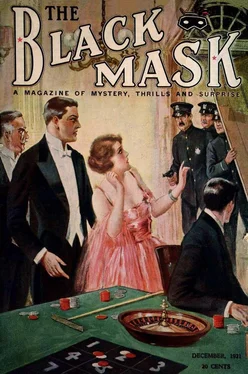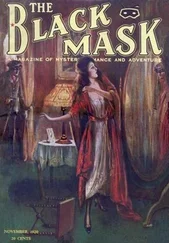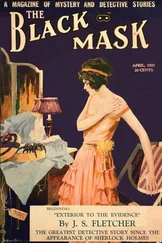Meredith Beyers - The Black Mask Magazine (Vol. 4, No. 3 — December 1921)
Здесь есть возможность читать онлайн «Meredith Beyers - The Black Mask Magazine (Vol. 4, No. 3 — December 1921)» весь текст электронной книги совершенно бесплатно (целиком полную версию без сокращений). В некоторых случаях можно слушать аудио, скачать через торрент в формате fb2 и присутствует краткое содержание. Город: New York, Год выпуска: 1921, Издательство: Pro-distributors Publishing Company, Жанр: Классический детектив, на английском языке. Описание произведения, (предисловие) а так же отзывы посетителей доступны на портале библиотеки ЛибКат.
- Название:The Black Mask Magazine (Vol. 4, No. 3 — December 1921)
- Автор:
- Издательство:Pro-distributors Publishing Company
- Жанр:
- Год:1921
- Город:New York
- ISBN:нет данных
- Рейтинг книги:3 / 5. Голосов: 1
-
Избранное:Добавить в избранное
- Отзывы:
-
Ваша оценка:
- 60
- 1
- 2
- 3
- 4
- 5
The Black Mask Magazine (Vol. 4, No. 3 — December 1921): краткое содержание, описание и аннотация
Предлагаем к чтению аннотацию, описание, краткое содержание или предисловие (зависит от того, что написал сам автор книги «The Black Mask Magazine (Vol. 4, No. 3 — December 1921)»). Если вы не нашли необходимую информацию о книге — напишите в комментариях, мы постараемся отыскать её.
The Black Mask Magazine (Vol. 4, No. 3 — December 1921) — читать онлайн бесплатно полную книгу (весь текст) целиком
Ниже представлен текст книги, разбитый по страницам. Система сохранения места последней прочитанной страницы, позволяет с удобством читать онлайн бесплатно книгу «The Black Mask Magazine (Vol. 4, No. 3 — December 1921)», без необходимости каждый раз заново искать на чём Вы остановились. Поставьте закладку, и сможете в любой момент перейти на страницу, на которой закончили чтение.
Интервал:
Закладка:
IV
When I got back the other fellows listened politely enough but they were too busy with another angle of the case to take my fleeting vision very seriously. Brierly and Campbell were seated at the big table in the living-room with the notes and papers they had taken from their pockets before them. Stanwood was in his room and Corrigan was keeping watch on things outside, as one of us always did.
Brierly was talking, or rather thinking aloud, as he reviewed the facts we all knew and sought to find some hidden meaning in them.
“There was Adams,” he said, “the first one to drop out, Seattle shipbuilder, supposed to be a millionaire, bachelor and privileged to have brought this Miss Johnson here with him if he wanted to, I suppose. No discoverable reason for running away or committing suicide. No idiot would try to run away from here on foot anyway.
“The Johnson girl knows nothing about it or I’m a Dutchman. Says he went to the king’s room to go to bed, she heard him scream and the room was empty when she got there. Windows all closed — no other door. No one here who could run the car and after two days of it she went sort of off her head and tried to get out on foot.
“Then come Hunt and Terwilliger. They were here together and alone except for a Jap valet and chauffeur. No one knows what door they went through. The Jap says he had gone to his room over the garage after eating his supper and that they were gone in the morning. Certainly they left the car behind. Both were good friends, prosperous business men, happily married, out here, apparently, just for a little rest.
“Now we come to the boss’s friend. What happened to him? Successful lawyer, fine record, brilliant future, no troubles that we know of. Bit of a rounder, he was, they say, and I guess it’s true if that Kilmer girl came out here with him. Tried to find him, she says, after he vanished. Doesn’t remember where she last saw him, she says, but thinks it was some place inside the house here. Now what became of him?”
“What in hell became of any of them?” Campbell answered with a shrug of his shoulders.
We were silent for several minutes. Then Brierly shifted his position suddenly and hurriedly relighted his pipe — a sign that he had an idea, or at least thought he had.
“What business was Adams in?” he demanded of us.
“Shipbuilding, you idiot,” I answered, because he knew as well as I did.
“And what business were Hunt and Terwilliger in?” was his second question.
“Airplane spruce — what’s the idea?” I grunted in reply.
“And the boss’s friend. What was his game? Lawyer, wasn’t he, but what kind of clients did he have?”
That set Campbell and me to thinking. Who were his clients?
“Corporation lawyer, wasn’t he?” Brierly asked, eagerly. “Handled things in a legal way for big firms, gave advice to big manufacturers, didn’t he?”
We agreed that he did.
“Was he attorney for Adams’s shipyard?” Brierly went on. “He was. Here’s his name on the letterhead as one of the directors. He was general counsel for Hunt and Terwilliger’s lumber company, wasn’t he? You bet he was and a stockholder in it, too.
“Is it just a coincidence or is there anything funny in the fact that all four of these men were big figures in the munition business out here?”
Campbell took his feet down from the table and I started scratching my-head as this new angle soaked in. They were in the munition business — all four of them — but who — how — what connection was there between that fact and their mysterious disappearances? Neither Campbell nor myself are particularly quick thinkers. We sat silently, waiting for Brierly to go on.
“Why did these men come out here?” he asked. “Was this place advertised for rent? No. Very few people knew anything about it and you know that Stanwood refused several pretty good offers from people who did know, but whom he didn’t want out here for some reason or other. Some people asked to come and were allowed to do so. We know who they were and know that they paid well for the privilege. They got back all right and told some of their friends about the place.
“But how did these missing men get out here? Tell me that.”
I turned to Campbell. He had done most of that end of the investigation and I was not quite sure of this angle of the case myself.
“Stanwood invited them,” he answered.
“Sure of that?” asked Brierly.
“Positive. He urged all four of them to come. Why? What the devil are you driving at anyway?”
For answer, Brierly leaped from his chair and ran softly from the room over to the bedroom wing of the house. He opened the door into the hall noiselessly and disappeared for a moment.
“It’s all right,” he reported as he resumed his seat. “Stanwood’s in his room, reading.”
“What of it?” Campbell wanted to know.
“Just that we’ve got to make sure that he stays there or some place else where we can find him when we want him,” was the reply. “Go tell Corrigan to keep an extra eye open and then hustle back here.”
We smoked in silence until Campbell came back and Brierly was ready with a new line of questions. He was a man who thought a lot and let his thoughts sort of simmer in his head until they jelled. Then he was ready to talk and when he talked it was to some purpose.
“Who is Stanwood?” he demanded.
“Englishman,” I answered. “Sort of upper-class servant. Has worked for Plainfield for years. Gambles, drinks and runs with women when the boss isn’t here.”
“How do you know he’s English?”
“Well, I don’t,” I admitted. “But he’s been accepted as English here and over in Canada for a long time. Talks about England and all that sort of thing.”
“Humph,” grunted Brierly. “Remember that Austrian chap we rounded up after he blew up that ship in Seattle harbor last month? What was his name?”
“Good-looking, well educated chap,” I muttered. “Why it was — Stan — Stan—,” and I turned to Campbell, who had made the arrest.
“Goshamighty, Stanwich,” Campbell exploded.
“Exactly,” said Brierly, with an air of great satisfaction. “Stanwich. And do you remember that our friend inside there showed a particularly keen interest in that case and that he was asking about it only this morning?”
“Yes,” I nodded; “but what possible connection is there between that and this case here?”
“Just this,” said Brierly, slowly and distinctly: “I’ve a lot more than a hunch that our friend is no more English than Song Chin, that his name is Stanwich and not Stanwood, that these two men are either brothers or cousins and both on the same job.”
“You mean—?” I asked.
“I mean that the fellow in jail down in Seattle destroys munition ships and the fellow in here destroys munition makers and that they both work for the same boss. These four men were all munition makers and Stanwood either murdered them or knows how they were murdered.”
It was a little too much for me and I sat still, thinking hard. Campbell started up and made for the hall door, but Brierly halted him.
“What are you going to do?” he called.
“Sweat it out of the devil,” he answered.
Brierly shook his head.
“Can’t be done,” he said. “He’s too deep for that. There’s a trap in this house some place and we’ve got to find it.” Then he turned to me. “What was that again you thought you saw on the side of the cliff?”
I explained again and we waited for Brierly. He was senior man and besides had the clearest head in the party and we readily agreed as he outlined his plan.
“Campbell,” he said, “you and Corrigan go through the king’s bedroom again. It’s the most likely place and that’s where the girl says Adams disappeared with a scream. Mac, I hate to ask you to do it, because I know how dangerous it is, but you’re the best boatman and we ought to know what that thing is you saw. I’ll relieve Corrigan outside and think things over.”
Читать дальшеИнтервал:
Закладка:
Похожие книги на «The Black Mask Magazine (Vol. 4, No. 3 — December 1921)»
Представляем Вашему вниманию похожие книги на «The Black Mask Magazine (Vol. 4, No. 3 — December 1921)» списком для выбора. Мы отобрали схожую по названию и смыслу литературу в надежде предоставить читателям больше вариантов отыскать новые, интересные, ещё непрочитанные произведения.
Обсуждение, отзывы о книге «The Black Mask Magazine (Vol. 4, No. 3 — December 1921)» и просто собственные мнения читателей. Оставьте ваши комментарии, напишите, что Вы думаете о произведении, его смысле или главных героях. Укажите что конкретно понравилось, а что нет, и почему Вы так считаете.












